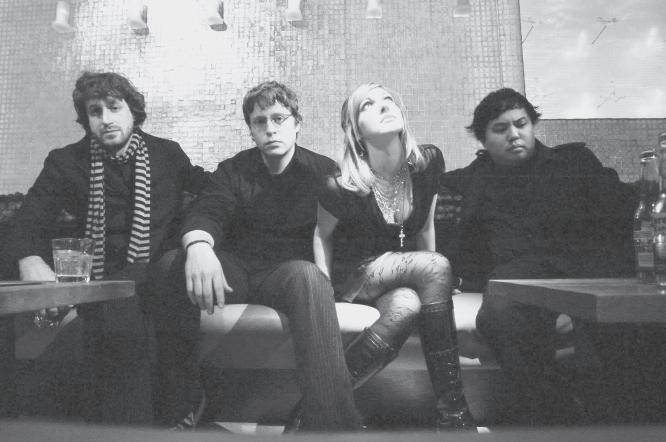
5 minute read
McCain rallies support on hardball tour
CHRISTOPHER R
BLAKE
ASST NEWS EDITOR
CRB724@CABRINI EDU
The atmosphere inside Villanova University’s Pavilion Tuesday had all the exuberance of a Wildcats’ basketball game. The cheering, sold-out crowd waved blue and red boom sticks. Cheerleaders and the Wildcats mascot were on hand to amp up the fans. But the Wildcats would have to wait until next season to pack the arena. This boisterous crowd was filling the stands to be part of history — witnessing the live broadcast of MSNBC’s Hardball with Chris Matthews and his guest, Sen. John McCain, Republican presidential candidate.
Cabrini sophomore Sean Ahern, an information systems major, was in attendance and was able to sit on the stage with other students only feet from the presidential candidate. Ahern even had the opportunity to shake Matthews’ hand.

“I went to the show for the entertainment value. I knew going into it I was not a big McCain fan. I am a huge fan of Chris Matthews’ show,” Ahern said.
Villanova was chosen as the second stop on the Hardball College Tour. The program is a regularly scheduled news talk show that is broadcast weekdays at 5 and 7 p.m. Matthews, a native of Philadelphia, launched the College Tour April 2 at West Chester University with a live interview of Sen. Barack Obama, Democratic presidential candidate.
Hardball was created in 1999 and has a proud tradition of touring some of America’s great universities, including Georgetown
University, the University of Notre Dame and Harvard University, among others. Marquee guests have included Rudy Giuliani, Sen. Hilary Clinton and Gov. Arnold Schwarzenegger.
At Villanova, Sen. McCain was interviewed by Matthews on key issues of the 2008 presidential election, and students had the opportunity to question the candidate.

One student brought up Barack Obama’s recent controversial speech on racism at the National Constitution Center, when Obama alluded to his racist grandmother, referring to her as a “typical white person.” The student asked McCain, “Would you characterize yourself as a typical white person?”
MCCAIN, page 3
Editorial
Do college students buy into sex?
College is often seen as a place to learn and grow as an individual, a time to transition into adulthood. Attending lectures, writing papers and studying long hours are what the average students do during their four years at college.
This time can be spent exploring more than just your intelligence and future plans. For many the journey includes exploring their sexuality. Whether students are engaging in sexual activity or not, active sex has become a stereotype of college students.
We seem to be a generation driven by sex. Whether it is in your personal life or in TV and advertising, sex is all around us and has become part of our culture.
In a society where casual sex, no strings attached and friends with benefits are the norm and even celebrated, it makes you wonder if sex once you become married will still be sacred. When did sex turn from something special between two people in love to a casual activity with no consequences?
No consequences? Of course there are consequences but after a few drinks and being immersed in the college environment, health class seems to go out the window. Everyone is aware of STDs and the necessity of condoms, yet there are 19 million new infections of STDs each year.
According to collegedrinkingprevention.gov, 400,000 students ages 18 to 24 had unprotected sex, and 100,000 students reported being too intoxicated to know if they consented to having sex.
Have we been fed so much sex through the media that we start to mimic what we see?
The media have taken sexual images and made them a staple of the American lifestyle, using them to sell products like perfume, clothing, alcohol and even fast food.
The National Eating Disorders Association reports that one out of four TV commercials sends some kind of “attractiveness message,” suggesting to viewers what is and is not attractive.
The CW’s new season of “Gossip Girl” stirred up much attention following racy TV and print ads that showed high school teens engaging in sex. The ads were a bit provocative but that is what the VP of marketing and brand strategy for The CW was going for. He wanted an advertisement that stood out to the audience.
A study done by the American Psychological Association showed that the increase of sexualized images of girls and young women in advertising, merchandising and media is destructive to girls’ self-image and healthy development.
Although a majority of advertising is based around sexy icons, Dove dared to step outside the box. Dove’s campaign for real beauty finds it important to show realistic images of women in their campaigns and empower them to celebrate whatever body they have.
Dove conducted a study of average women around the world and the results were startling. Only 2 percent of women around the world consider themselves beautiful. Forty-five percent of all women said women who are more beautiful have greater opportunities in life.
Despite the stereotype of sex-driven college students, Cabrini students hold a variety of attitudes and beliefs towards sex. As seen in Chris Blake’s article on virginity, some students have stayed strong to their beliefs, saving sex until marriage or someone special while others engage in casual sex. In reality, sex holds a different meaning for all of us.









